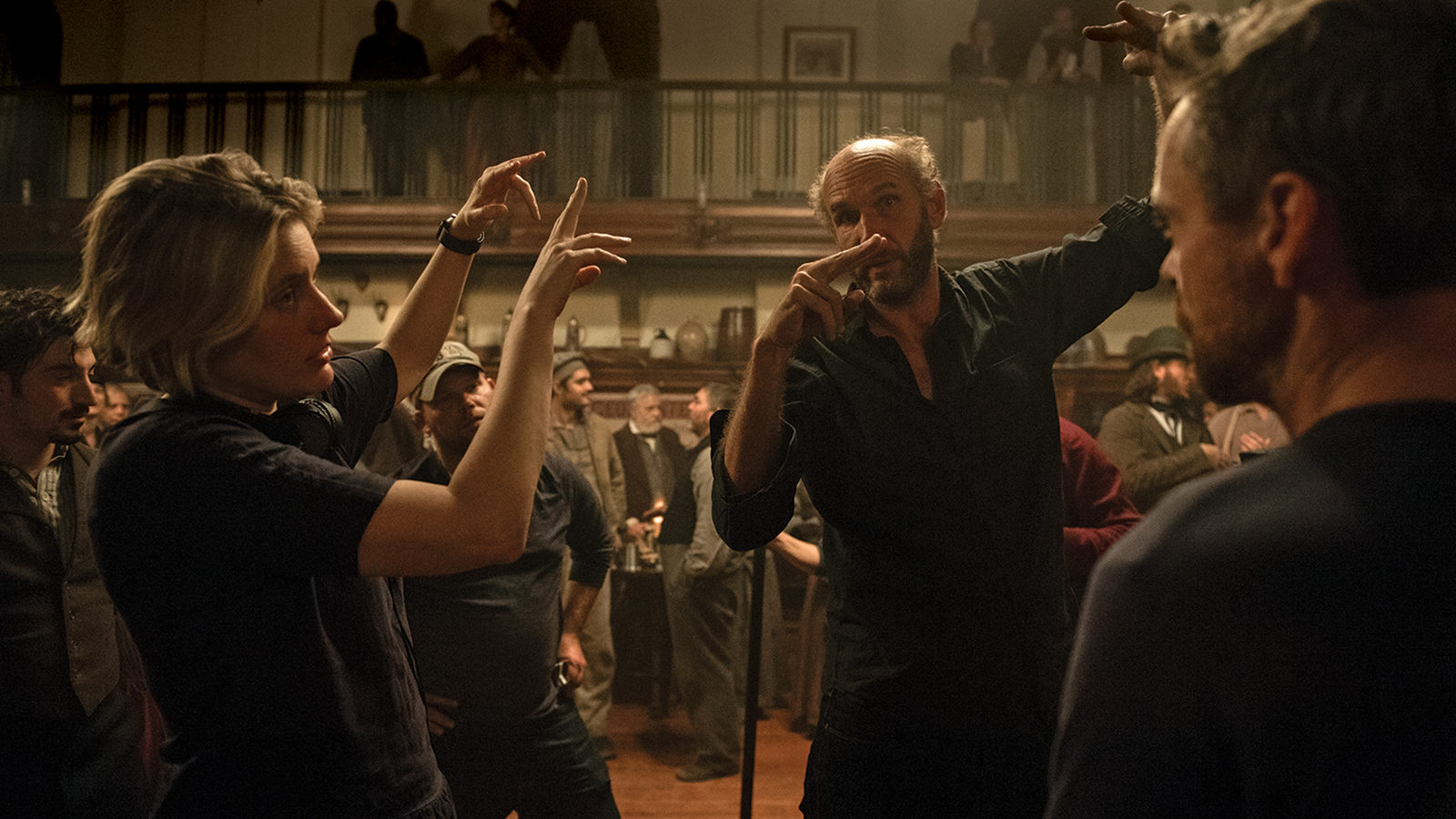
Life’s Work
A new adaptation of Little Women isn’t so much an event as a beloved ritual: Louisa May Alcott’s classic 1868 novel has been adapted many times since its publication—five for the American screen alone, and plenty more for theater, television, and radio, reacquainting each new generation with the winsome story of the four March sisters living in genteel poverty in 19th-century Massachusetts. Yet the latest cinematic incarnation, written and directed by Greta Gerwig, arrives like a thing entirely of its own, and of its own time. It’s an adaptation so rich, so attentive to its source, and yet so thrillingly personal, that the combination of maker and material feels like an alignment of stars. And an ascension of one, too—Little Women is only Gerwig’s second solo directorial effort, after 2017’s Lady Bird, and it propels her into a league of her own. Gerwig doesn’t quite reinvent the novel but rather discerns, with X-ray-like intuition, the kernel that has made Little Women so formative for generations of ambitious women: it’s the story of a woman who wants to write, and write she does. And Gerwig also understands that this woman isn’t just Jo March—the tempestuous tomboy-protagonist of the novel—but also its author, Louisa May Alcott.
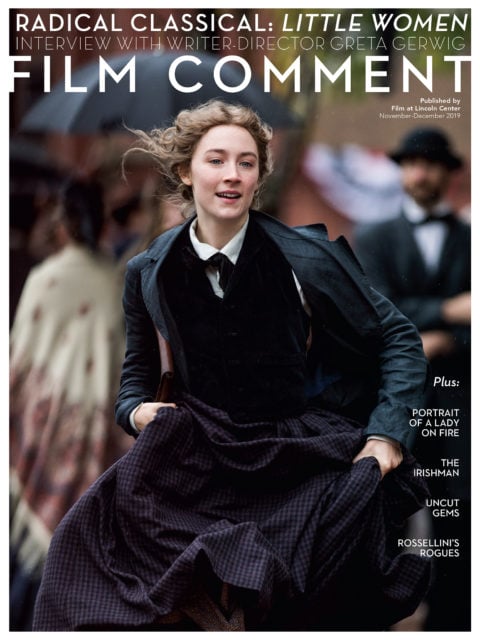
Alcott’s Little Women was originally published in two parts. The first traces a year in the lives of the Marches—teenage sisters Meg, Jo, Beth, and Amy, and mother Marmee—as they try to get by while their father serves in the Civil War; in the second part, set three years later, the sisters navigate work and love and marriage, and contend with the declining health of Beth. Gerwig rearranges the novel, crosscutting between its two halves and reorganizing them around Jo’s writerly pursuits, finding natural points of narrative (and sometimes strikingly visual) connection. Instead of starting with the text’s first line—“Christmas won’t be Christmas without any presents!”—the film opens with Jo (Saoirse Ronan) standing in the doorway of a literary press, silhouetted against its light in a rare moment of stillness. Then she enters the office, submits one of her stories to the editor on behalf of a friend, and upon its grudging acceptance, gets paid.
Jo’s initial moment of hesitant ambition, and its turn to ecstatic pride when her story is accepted, ripple through Gerwig’s film— which becomes, through its braiding of timelines, a portrait of the ways in which the dreams of girls grate against the pressures faced by young women. Amy, the painter, must contend with the difficulty of sustaining herself in a profession whose terms are dictated by men; aspiring actress Meg with the allure (and expectation) of a family life; and Beth, the gifted pianist, with the cruel and crude vagaries of mortality. Jo’s passions undergo their own maturing and tempering, but her story culminates, crucially, not just in marriage or death—as Jo’s editor tells her all women’s tales must end—but also something else: a published work of her own.
One could draw a straight line from Gerwig’s dancer-heroine running (and skipping, and twirling) through the streets of New York to Bowie’s “Modern Love” in Frances Ha (2012), to Jo running euphorically through the same city, in another time, in the opening scenes of Little Women. This latest film seamlessly continues the preoccupations of Gerwig’s previous work, which includes directing Lady Bird and co-writing Frances Ha and Mistress America (2015): the terrible intimacies of sisters; the complexities of mothers and daughters; and the existential lives of women in states of becoming, their realities hopelessly exceeded by their own desires. These protagonists are all caught up in an ineffable sense of want—to be someone else, to be somewhere else—that slowly, through and with the other women in their lives, sharpens into a bittersweet understanding of who they are and where they belong. Here, the modest settings and contemporary, urban characters of the earlier films are reimagined within the grander, weightier frameworks of history and literature. The becoming of the characters in Little Women is also the becoming of an era, a canon, and a kind of womanhood.
Gerwig brings these ideas, big and small, into fluid conversation as her film approaches one odd contrivance of Alcott’s novel: the marriage of Jo—who for most of the film aspires to be a spinster all her life, as Alcott in fact was—to the middle-aged German professor Friedrich Bhaer. It’s the plot point that seems most ill-suited to adaptation in 2019, but Gerwig turns it into one of the film’s most original and modern sections. She addresses the sellout artifice of Jo’s marriage head-on through a negotiation scene between Jo and her editor on matters of pay, copyright, and gendered expectations in popular literature. It’s a moment that nimbly layers the text of the novel, details of Alcott’s life and career, and meta-reflections on Gerwig’s own place as the latest director to adapt a much-mined book, into an extraordinary palimpsest of our evolving notions of authenticity and ownership.
Gerwig grounds the intellectual and historical scope of her film in a sincere regard for her characters as real people and the settings as real places, not artifacts or archetypes of a different time. Her actors embody that same sincerity in gentle, loose performances, nestling into roles that seem cut to shape for them but also demand a certain self-awareness. Ronan amplifies the vulnerable recklessness of her character in Lady Bird, brimming with purpose and anger and tenderness; Emma Watson fits the part of the prim, elegant Meg, vain yet wise and kind; and Timothée Chalamet, far softer and more sheepish than the Lauries of previous versions, is deftly convincing as a charming companion but unserious match for Jo. (Louis Garrel is also especially welcome as a younger, more affable version of the stuffy Professor Bhaer.) It’s Florence Pugh as Amy, however, who emerges as the true standout: she persuasively transforms the book’s slightly shallow second-fiddle character into the most clear-eyed among the sisters, her coming-of-age fostered by the compassionate insight of Laura Dern’s Marmee and the stern but necessary cynicism of Meryl Streep’s Aunt March.
That these actors are all stars, rising or already part of the firmament, means that they each feel as singular as they’re meant to be, as individuals finding their distinct paths through history. And yet the film’s energy derives from their warm and crackling interplay with one another—a feat as much of directing as it is of acting. Gerwig and her collaborators, DP Yorick Le Saux, composer Alexandre Desplat, and editor Nick Houy, animate Little Women with a precise sense of rhythm: its characters run and dance and skate and chatter through scenes that speed and slow and tumble into each other. Few adaptations of Little Women—and indeed, few period dramas—have felt as alive, immediate, and fleet-footed as this film, a work overrun by feeling and yet structured by ideas.
In early October, I met up with Gerwig in New York to chat about Little Women, in a conversation as lively and full of revelations and references as her film.
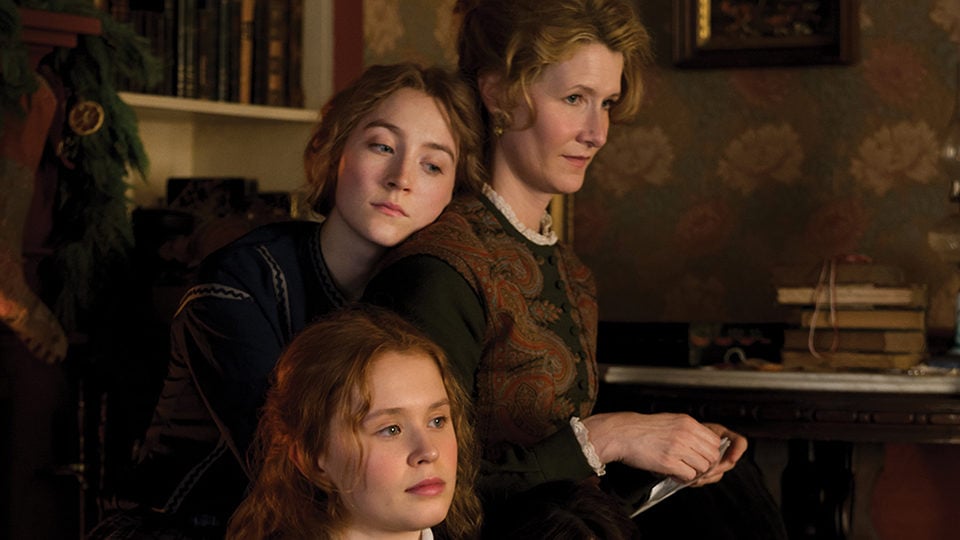
Saoirse Ronan, Laura Dern, Eliza Scanlen, Florence Pugh and Emma Watson in Greta Gerwig's Little Women. Wilson Webb/Sony Pictures
I read Little Women as a child, and I was not familiar with the context of the book at all at that age, but the one thing I did understand was: this is what it means to be a girl and want to write. A lot of significant women writers—Simone de Beauvoir, Susan Sontag, Ursula Le Guin—have said similar things about the book.
Patti Smith, Elena Ferrante, J.K. Rowling.
Stephanie Meyer.
I mean, it’s incredibly strange and beautiful that all these different women [feel that way]. Have you read the Neapolitan quartet, by Elena Ferrante? Little Women traces through that, too. I almost dropped the book while reading it. I was like, “Of course this is her book.” And it’s certainly not because Jo marries Professor Bhaer. That’s not why we love her and that’s not why women who wanted to be writers have flocked to her.
Not in the hopes of meeting an older German professor who gives them scathing feedback.
Who doesn’t like what they’re doing. And makes Jo use the word “thou.”
Did you also have the experience of reading it young? Was it a book that signaled to you who you were in the world?
I did not read it [at first]. It was read to me by my mother. So I don’t remember a time when I didn’t know who the Marches were. I always knew who Jo was and who her sisters were. It was one of the books I had in my bookshelf and I was a re-reader, so I read it lots and lots of times. Before I wrote the script, probably the last time I read it all the way through was my mid-teenage years—14, 15. When I read it in my thirties, it was a vastly different experience. But when I read it as a child, it’s hard to say… I don’t know if I was like Jo and that’s why I loved her, or if I made myself like Jo because that’s who I loved. Did I want to be a writer and then find this character? Or did that character make me want to write?
That’s fascinating, because I think that’s a recurring theme in a lot of your work—people trying to live up to certain intellectual or literary or cultural ideals, and not knowing where that desire comes from or whether it’s genuine. There’s this line in Mistress America that I love, where Tracy says, “I know what it is to want things.”
I haven’t watched that movie in a while, but I remember that line now that you’re saying it.
I don’t know who wrote it. Whether you wrote it or Noah.
It sounds like one of mine. [Laughs]
That line has always stayed with me because it captures what that film, Frances Ha, Lady Bird, and now Little Women are all about—they’re films about yearning, but not quite knowing what the object of your yearning is.
This sort of inchoate desire, or desire that doesn’t have an object, is interesting to me, because I think it’s so much a dimension of what it is to be an ambitious woman. Because, for every other moment in human history, [that ambition] had nowhere to go, at all. And we’re just now getting the chance to put it somewhere other than marriage. But even marriage, as a goal, as the sort of Jane Austen marriage plot, is [fairly modern]… I mean, really, the idea that women weren’t property is new.
So while making Little Women, the one thing I kept thinking about was the ending. This thing that all these luminous women [who were inspired by Little Women] don’t love is that she ends up with Professor Bhaer. I wanted to construct a movie where, when Jo gets that book at the end and holds it, you are getting the satisfaction of something that you didn’t know you needed to see. But as soon as she gets it, you think, “I needed it and I didn’t know it.” To me, that is the desire incarnate, the desire fulfilled. I think that it’s funny that all these women love the book because obviously there’s this divergence: Louisa May Alcott didn’t get married and didn’t have children, and Jo does and she stops writing at the end of the book, because she felt like what she was writing was bad.
What is the phrasing in the book? She “corks up her inkstand.”
But as [Louisa May Alcott] keeps writing books, like Jo’s Boys and Little Men, Jo becomes more like Louisa. Girls are let into Jo’s school [which she opens with Professor Bhaer], and she starts writing again, and she writes a book like Little Women. So I kind of collapsed the ending that way. This difference between what Jo does and what Louisa actually did is this chasm, and I think on some level all these women who read Little Women did know that she’d actually done that, they knew about the doubling, that she’s Jo and Jo is her but there were [still] these differences.
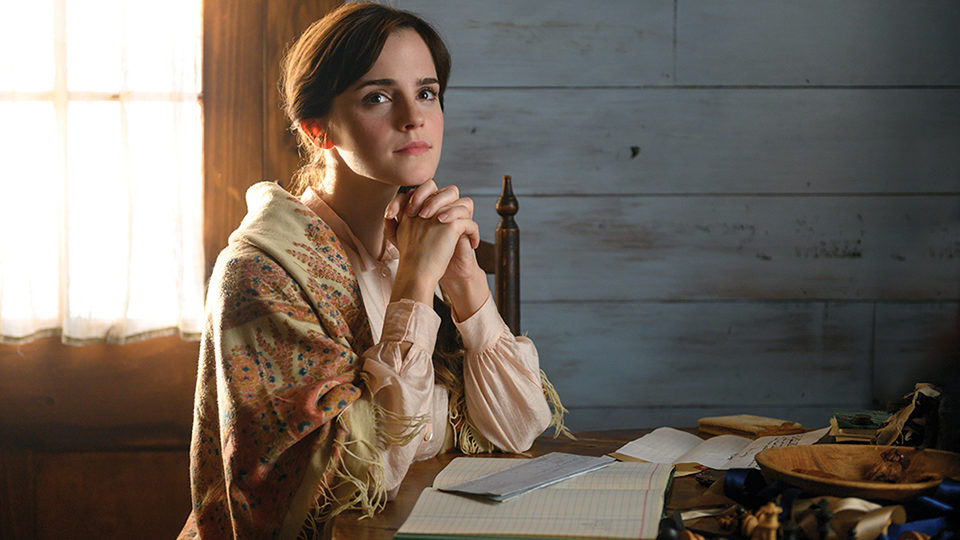
Emma Watson in Little Women. Wilson Webb/Sony Pictures
I went down a Louisa May Alcott rabbit hole, and her life… now that’s a movie. And you’ve made that movie. Alcott wrote to a friend that she only came up with this ending because she got letters from all these women who wanted Jo to get married. And her phrasing was something like, “I made a funny match for her out of perversity.”
Yeah, out of spite! Out of perversity!
So maybe all these women who grew up reading the book sort of knew it was a contrived ending.
Yeah! In the movie, I always knew that I wanted the ending to lead you there and then say, why is it that you need this? Or why do you want this? Someone said at some point, “When Professor Bhaer shows up [at Jo’s house], it’s like deus ex machina”—and it is deus ex machina, that is what it is, he just shows up. In the book, he just appears! He doesn’t need to appear. And also, there are so many things in the book that I didn’t have time to explore. There’s someone at Jo’s boarding house, a woman that she’s friends with, who’s not married, and who’s her best friend and takes her to concerts and stuff, and you think, wait, is that secretly you, Louisa? Who’s this woman?
Alcott has said things that sound like she might have been what we think of today as queer.
Right. I didn’t want to assign anything that felt too modern to her but… there’s lots of stuff. I mean, the thing she said, “I have half a mind to think I’m a man born into a woman’s body.”
And “I have fallen in love with so many pretty girls.” You don’t know exactly what she meant by “in love.”
Right. I mean, the passion she felt for her sisters was not sexual, but she felt a possessiveness and anger that they couldn’t stay in their female utopia for their entire lives.
And that’s exactly like Frances Ha.
Yes, it is. For me, I don’t have to go far—I love my group of female friends, I write movies about not wanting to disrupt that, whether it’s sisterhood or mothers or friends. But in any case, I just knew I could not do the ending just as the book [did]—especially because Louisa didn’t really want to end it that way, and she really did think Jo’s true fate should’ve been as “a literary spinster with books for children.” And so I thought, I can’t in good faith do this ending, number one because it’s not in me, number two because she didn’t like it, and if we can’t give her an ending she would like, 150 years later, then what have we done? We’ve made no progress.
The distance between life and fiction is moving to me in general. With the Marches, they’re the genteel poor, while the Alcotts were wretchedly poor. They moved something like 30 times in Boston when she was a teenager because they kept getting kicked out of places because they didn’t have enough money. Louisa and her sisters and her mother did grueling work, and none of that’s in the book, because that isn’t what was going to sell. So it was all of the good things [of their life] wrapped up in something she wishes she had, and I find that difference very moving.
How did this movie come about?
I knew that there was a desire with Amy Pascal and Sony because it’s been 25 years [since the 1994 version], and a lot of young women don’t know what this book is. This was before I directed Lady Bird, but I had written the script for it, and I heard from my agent that people were meeting about Little Women. And I said, oh you have to get me a meeting. I have to write and direct that film. And he said, no studio is going to hire you to direct a film when you haven’t directed a film. And I was like “That’s semantics! I’m on my way!” So I went in and I had this very clear idea. To me, it was so clear that the book was about women, art, and money. The emotional core about sisterhood and family was true, but there was this other very nuts-and-bolts side of it, which was equally emotional. The first line of the book is “Christmas won’t be Christmas without any presents. It’s so dreadful being poor. It’s not fair that some girls have lots of pretty things and other girls have none at all.” And I was like, “This book’s about money.” And Louisa’s life, as it turns out, as I did my research, was also about that. A lot of the lines I give Louisa—or Jo/Louisa—are from [Alcott’s] letters, from her diaries, from her writing. When Jo says in the film, “I can’t afford to starve on praise,” that’s from her. She was making economic decisions constantly.
The unromanticness of her writing, the mercenary way in which she approached it as a job, feels so romantic today. She sold her stories to make a living.
Yeah, like, what sells? And Little Women did sell out in its first printing in two weeks, and she did keep the copyright because she knew to, and she also got 6.6 percent of the profits, because her publisher didn’t think that people would buy it. I also thought each of the girls’ pursuits aren’t “adorable”—they’re big and serious. All the chapters of Amy in Europe realizing she’s not a great artist, they’re amazing. As I dove in, I realized that the moment when May, who’s the Alcott sister Amy is based on, was in Europe, was exactly when we saw the very beginnings of modernism in art. Cézanne is painting, Manet is painting, and to go to Rome and see the Old Masters and think, no, I’m not going be that, and then to go to Paris and see people who are starting to use paint as the subject itself, and realize you’re not doing that either… that’s a crisis of faith, if that’s what you thought you were meant to do.
So I had all these ideas. And the thing that I read that articulates that idea—“women, art, and money”—the best is Virginia Woolf ’s A Room of One’s Own. Which everyone remembers as [high-pitched voice] “To write you need a room of one’s own.” You think of a garret and a little cozy fire and you’re wrapped in your shawl and you’re alone and you’re writing. But what she actually says is you need a room of one’s own and money. Because she was asked to speak on why there are no great women writers, and she said the question isn’t why are there no great women writers, the question is: why have women always been poor? Because women have always been poor, not for 200 years merely, but since the beginning of time. And she said, “Poetry depends upon intellectual freedom, and intellectual freedom depends upon material things. Women, then, have not had a dog’s chance of writing poetry.” How could you possibly? If you don’t have money, you can’t write poetry.
I felt like that idea is being expressed both through Louisa May Alcott and through Jo, and I wanted to make a movie about that. And the other thing, when I started writing, I started looking at the two parts of the book as two separate books. The girlhood part, the first half, was Christmas to Christmas, 1861 to 1862—that was the first publishing. And then the second book, Alcott joked, should’ve been called The Wedding Marches, because she had to marry them all. Suddenly there were all these things I felt were mirrored in each other, the biggest one being Beth and her illness. To me it’s the fairy tale versus what life is. In the first book, she gets sick, then she gets better, and in the second book, she gets sick and then she dies. And it was that doubling that made me think, well, what if I could layer these two things on top of each other, because in my experience of a lot of fiction about women, there’s this sense that all the adventures happen when you’re a girl or a teenager, and as soon as you become an adult, it’s all over, and it’s not that interesting. And I cannot have that be the story we’re telling young women. I felt like I wanted to give the March women back what they had as girls. That felt to me like part of the task of this film, because I can’t tell you how many women are like, “I only read the first part.” If the thing we’re telling girls is that once you become an adult, it’s all over, that’s not good enough, because then there’s nothing left to desire, there’s nothing to look towards. If there’s no bravery and ambition and scope once you’re an adult, if it all existed as a girl and then you put away your childish things, it just feels not right. So I wanted to ground it in adulthood.
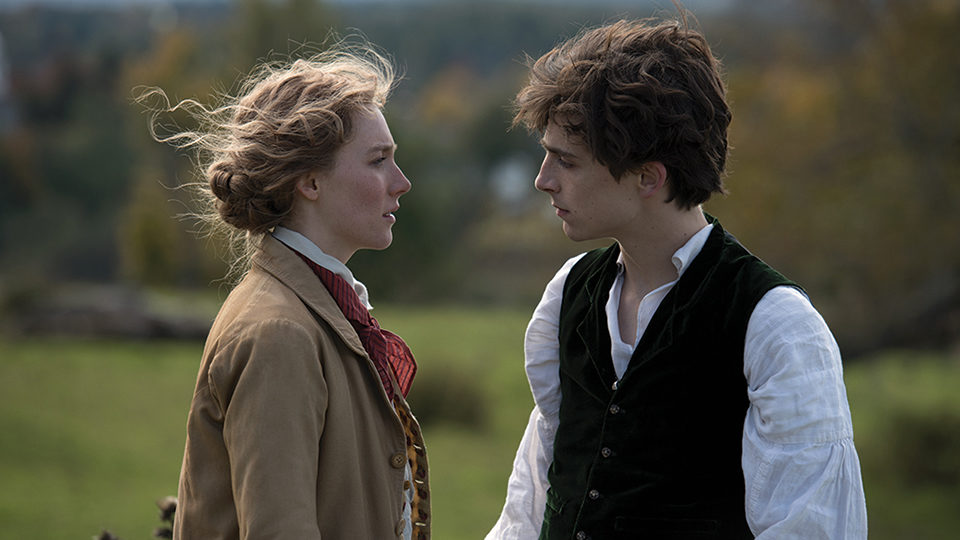
Saoirse Ronan and Timothée Chalamet in Little Women. Wilson Webb/Sony Pictures
It’s also interesting hearing you talk about how you encountered this film: it was already being made, and you made it personal to yourself. It sounds almost like how Louisa May Alcott was told to write this book and then it became a book about her life.
Right, she was assigned [it]. She said, well, there’s a market for young people. But when she initially wrote it, she did say, “I don’t think this is very good,” and her publisher also said, “I don’t think this is very good,” and it was his nieces who read it, and they said “Oh, this is great.” Also Little Women was published when Louisa was 36, and I’m 36…
God, this is cosmic!
I know. I had my chart read against Louisa’s…
And?
I mean, we’re not going to get married, we’d make a terrible marriage match. Apparently we had a lot of similarities, but hers was more lonely. Because she was ahead of her time. I always think she kind of pulled us into the 20th century, in many ways.
You’ve made this book feel very contemporary by digging into the real history of its publication in the 1800s. The conversation Jo has with her publisher at the end of your film, negotiating royalties and copyright, sounds like things we’re talking about in 2019, about women and authorship and ownership.
Since we shot that scene, there has been all this stuff about how Taylor Swift doesn’t own the masters to her recordings, and now she’s re-recording because she wants to own them, and I was thinking, who owns the art? Who’s profiting off of it? I felt the edge of that question and I found so much in Louisa’s story, and I wanted to see that. But the same thing happened to me with the language: people say to me, oh, it sounds so modern.
I thought it sounded looser than the book.
Most of it is from the book, though, almost word for word. I wrote extra stuff, but a lot of the lines that strike people, like Amy saying “I want to be great, or nothing”—that’s from the book. Marmee saying “I’m angry nearly every day of my life”—that’s from the book. Even all the things they say on Christmas morning, which are such famous lines that you could recite them all, like “We can make our little sacrifices, and ought to do it gladly”—I just had an idea of them being said so quickly, just thrown off like sisters’ talk.
It’s in the delivery.
A lot of it’s in the speed, which was very choreographed. I didn’t just have them do it quickly or talk over each other. When I wrote the script, I employed this technique that a lot of playwrights use: you have a line and then you insert a slash where the next person is meant to start talking.
Like verse.
Yeah. You have this slash and then the line keeps going, but the next person has already started their line. So I organized the script that way, and it was a lot of rehearsal. We would actually start it slow and then speed it up to choreograph when the lines would come in. We’d do the lines slowly and then you’d point at someone and their line would start, and then you would point at someone else and their line would start. It was this handoff. And we choreographed the scenes slowly, too, of moving through the rooms. The way I shotlisted it was I wanted everything to be swirling all the time. I didn’t want Steadicam, but I did want just a dance floor so that the camera could be on a dolly the whole time. And it was this slow building of the speed, so that by the time we got to it, they could do the Christmas morning in 20 minutes, just running, and it was amazing.
How do you intuit the right pace? In both Lady Bird and Little Women, rhythm seems so paramount to the filmmaking. Everything’s always flowing.
I don’t know. But I will tell you with Lady Bird and with this, the first note I always get from someone is “slow it the fuck down.” I don’t know where the rhythm part comes from, but if it doesn’t sound right to me, the whole structure falls apart. I think some of that is from theater, because in film, you can establish rhythm from editing, but in theater, you can only establish rhythm through language, so I think I still have that sense of wanting it to sound correct. I know it when I hear it, and when it’s wrong, it’s like someone I don’t know is touching my belly button.
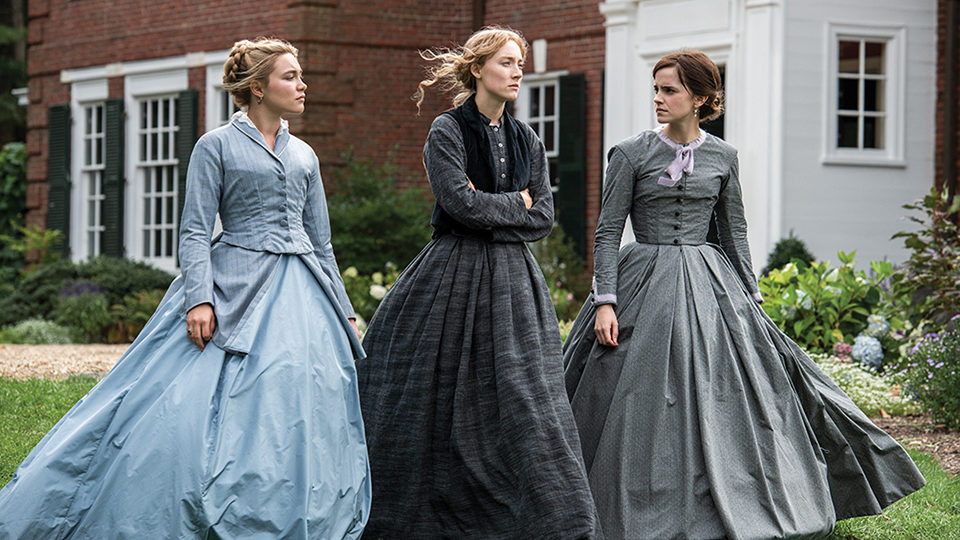
Florence Pugh, Saoirse Ronan and Emma Watson in Little Women. Wilson Webb/Sony Pictures
One line I have been thinking about every day since I saw the film is when Jo says to Marmee, “I’m so sick of people saying that love is all that women are fit for. I’m so sick of it, but I’m so lonely.” It encapsulates so much about trying to be a woman who’s ahead of your time, and trying to embody these feminist ideals, but also struggling to be a human in your time.
Yes, that’s hard.
That’s not from the book, right?
Well, the speech Jo gives is from another book Alcott wrote. I believe it’s Rose in Bloom: “Women have minds, as well as just heart; ambition and talent, as well as just beauty. And I’m so sick of people saying love is all a woman is fit for.” But then I added “But I’m so lonely.”
Was that from her chart?
[Laughs] No, I’d written a draft of this screenplay before I made Lady Bird. But once I made Lady Bird, finished it, edited it, and brought it out into the world, actually the day after the Oscars, I put all my research for Little Women in the car and I drove to this cabin in the woods. It’s almost like, for me, to be a writer-director, you have to know the whole thing in such a deep way. It has to be so real to you that it can’t not exist. Because you have to get everyone dreaming the same dream you’re dreaming. You need to believe in the reality of it, and for some reason, it’s something I do alone. So I was going through my research and I’d written that down out of the book, and I just… I was alone, and I heard Saoirse saying it in my mind, and then I heard her say “But I’m so alone.” I heard her weeping the whole time while she was saying it. And then I remember the moment on set when she said it, and I think I was crying because she just captures the whole feeling.
That line is also emblematic of how you make the film feel very immediate and present, but you also commit to its time and place with sincerity. I think period films sometimes struggle to achieve that balance. Were there certain films or texts that helped you figure out your approach?
I had my list of films. What I was very nervous about was that I didn’t want to make a period piece that felt nailed to the floor. That always happens, you can almost feel how expensive the lighting kit was. And you feel like you can’t move or breathe. I wanted it to feel light on its feet without being messy. I wanted it to feel like it was doing a very quick dance. And part of the reason I wanted to work with my cinematographer, Yorick [Le Saux], was because of this incredible movement [he achieves] behind the camera. You feel something restless behind his camera.
He seems to have a sense of the internal rhythm of each shot.
I Am Love [which Le Saux shot] is extraordinarily gorgeous, so I knew that he wasn’t scared of beauty, that he allowed himself to photograph things that are beautiful. But you’d be surprised—some filmmakers, some cinematographers, don’t want it to be too beautiful. I love his ability to embrace beauty in that way. Also, he has something that feels like he can both execute something and improvise at the same time. Like Carlos, the Assayas movie, it just never stops moving. If he made Carlos and I Am Love, well, my film is something in the middle of that. I just felt like the way to make it the most fresh was to keep it classical. The way to make it feel alive is to truly believe in the time. That’s why I didn’t want anything heavy about it.
I looked through a lot of paintings, photographs, a lot of research, to find what felt completely modern, because any time people live, it’s the most modern people who have ever existed! I can show you these wonderful photographs—I don’t know if you know this British photographer, Julia Margaret Cameron? She photographed women in the 1860s, and you will not believe these photographs, they just look like people you know. This is in the barrels of the research I was going through… [Scrolls through her phone and shows me a portrait of a young girl]
This is like an Instagram photo!
I know! And she looks so angry! Look at this face, she’s so annoyed.
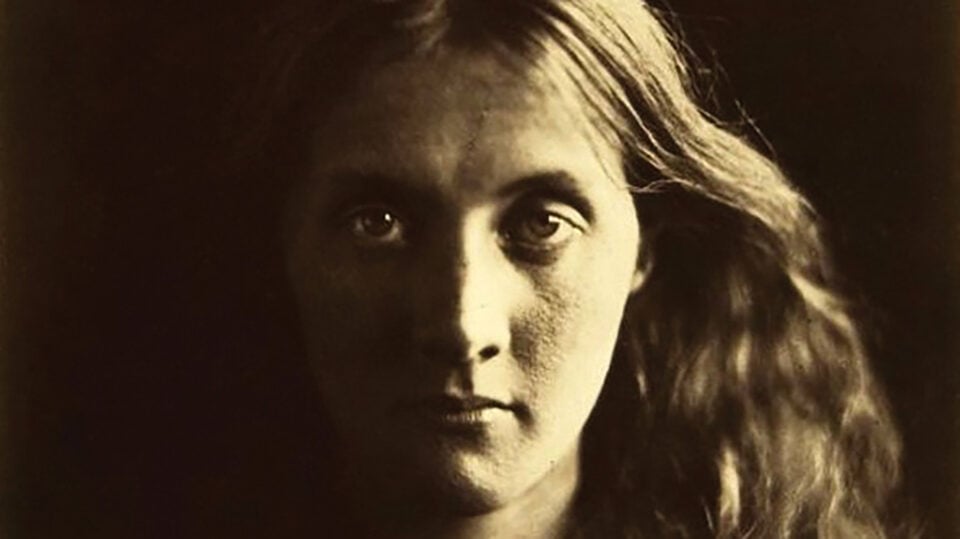
Julia Jackson by Julia Cameron
And her hair all tangled and greasy.
She’s totally arrogant, and when I saw this, I was like, “That’s a girl! That’s a girl I know.” There are tons of other photographs. [Keeps scrolling] This one is a bit Coachella, but look at all these girls in their flower crowns, it’s so wonderful. You feel like you know them. And look at these little girls! Look at their little messy hair! So I thought, okay, they were people, so we’re allowed to make them people. And then I thought about a lot about films that did period pieces that somehow didn’t seem already dead. Truffaut does it very well in Two English Girls. It never seems like you’re in a place you don’t know. Jules and Jim, too.
And in those films, it’s really about capturing a sense of movement and dynamism. The fact that these people ran, and—
The running… Louisa May Alcott ran, and I kept coming across this in research, and I thought, “They must mean something different. They must not mean running.” And apparently they did mean running. She has journal entries where she says things like, “All I was able to do today was go for my run and write,” and I thought, what in the world? But apparently, she would tuck up her skirts and go running in the woods.
Which is an image we rarely see in the more traditional period films.
Yeah, exactly. Other films I looked at: Fanny and Alexander, because it’s a ghost story, and because it’s so great. The entire graduation sequence in Heaven’s Gate, where they all waltz in that giant courtyard, they just seem like teenagers. I made everyone watch all this stuff. McCabe & Mrs. Miller, the way people talk sounds like the way people talk, it doesn’t sound so precise. The Story of Adele H., also Truffaut. Esther Kahn, the Desplechin movie about theater. The Dead, the John Huston movie, because it’s about recapturing something that’s gone. Weirdly, Meet Me in St. Louis, because I love Minnelli and it’s this idea of, what’s the idyllic version of childhood like? And the beginning of Gigi, before he sings “Thank Heaven for Little Girls,” the French promenade—that’s what we based the opening scene with Laurie and Jo on, strangely. Gigi. Lots of French films and musicals.
The way it’s edited, the film really feels like it’s set to music and movement.
When I talked to Alexandre [Desplat]—I had a lot of French collaborators, Yorick, Alexandre—I said to him that in some ways, what we see in this movie is a musical without songs. And he did such a marvelous score, so beautiful, and when it ends, when Jo has that wonderful look on her face [when she sees her book in a shop window], and we cut to black, there’s these last two notes. I had explained a feeling to him, which was: I wanted to give it back to the audience as if to say, “And now, you.” What are you making, what book are you writing, what song are you going to sing? And then he came up with this little end, which I thought, wow, that’s exactly what I meant. It’s amazing how much of filmmaking is on faith. I didn’t know what the music was going to be, and he had me show the film to him silent.
I can’t even imagine the movie silent, because of how much it feels set to the music.
Well, he watched it silent and I felt like… a horrible pain. But then he heard it! That’s what extraordinary about composers, they can hear.
Did you re-edit anything in response to the music?
Very little, because he wrote to the cuts that I felt were right. Working with a composer is like having a garment made for you—it looks great, you’ll never look better than when you buy something made for you. I remember when I talked to him initially, before I’d even shot anything. He’d read the script and he said, “The important thing to remember in cinema is, time only ever moves forward.” So even as you go back, you’re only ever going forward. And I thought about that a lot as we were shooting, that it is always advancing.
I wanted to ask about one more thing. Alcott grew up around Emerson and Thoreau and all these Transcendentalists, and she saw a kind of a compromised idealism around herself, these utopian communities that failed her father and her family. There’s a line in Frances Ha about Thoreau and Walden Pond—
Oh yes, there is! He lived five minutes from his mom’s house.
And he would go there to get supplies!
You know, you’re the first person who’s ever mentioned that and I was wondering if anyone would, because I don’t know if you’ve been to Concord, or been to Walden Pond, but it’s right there. He really makes it sound in the book like he’s far away. But his friends are a 20-minute walk away from him. I walked from my house in Concord to Walden Pond every weekend. It’s not that big a deal. I mean, I love Transcendentalism, I love Ralph Waldo Emerson, his work is incredibly dense but also fascinating and brilliant, and Thoreau, even though he’s a complainer, is brilliant also. But I am interested in the ways in which those things don’t really work for women. Or families. Every time I read Thoreau talking about how he’s going to build his hut and grow his peas and live off the land, I’m like, what is your wife going to do? Oh no, you didn’t have one, and you don’t have children, and this idealism about living at one with nature actually leaves aside the care of the family.
Which is what happened with Bronson Alcott, Louisa’s father.
Right, he brought them to live at Fruitlands, the vegan commune, where we actually shot. It’s where the little yellow house that Meg and John live in is. And we shot in Bronson’s schoolhouse, that he taught in. But this sort of “man alone with nature” thing doesn’t make sense in terms of a family, and it’s something I’ve thought about a lot. And the astonishing lack of understanding of what it takes to take care of a family is notable to me.
When you premiered Lady Bird at NYFF [in 2017], I asked you a question about the line in the film about love and attention, and you said you got it from Simone de Beauvoir. That made so much sense. It made me look at the film in a different way.
I think what I enjoy about being a fiction filmmaker and not having to write academic texts is I get to play with these different ideas from different angles. I don’t have to settle on an answer. That’s what I did love about going to school, and what I’ve missed sometimes, certainly when I was acting. There’s an itch I have to satisfy, that I can satisfy by writing and directing. This particular project was so satisfying to me in all the research and all the figuring out of how to make it, finding these puzzle pieces that fit—even the little things that no one will notice. When I was figuring out how I was going to weave this story this way, I suddenly noticed that when Meg goes to Vanity Fair, they call her Daisy, and later, she calls her daughter that, because it’s the last time she felt free. Doesn’t that just kill you? I felt that kind of satisfaction of things that jump out at you, that I would feel sometimes when I wrote papers. But luckily, unlike with papers, [with movies] I don’t have to fully answer everything. I can just enjoy the view of a neat thought.
Devika Girish is the Assistant Editor at Film Comment.







